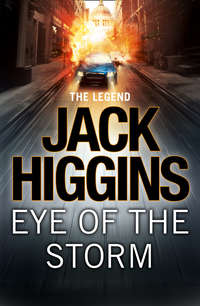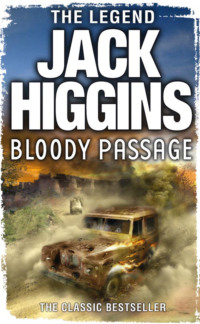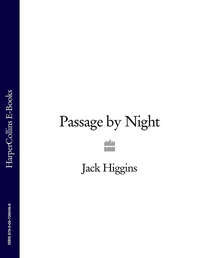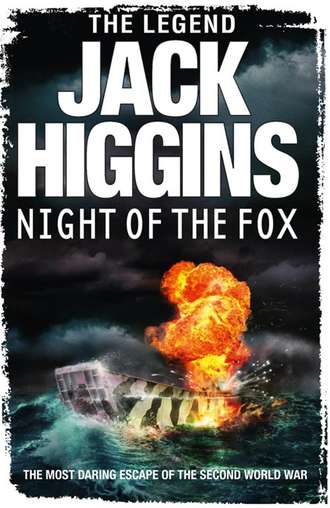
Полная версия
Night of the Fox

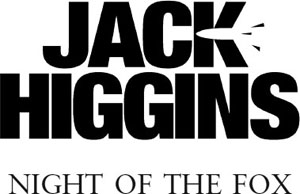


Copyright
This novel is entirely a work of fiction. The names, characters and incidents portrayed in it are the work of the author’s imagination. Any resemblance to actual persons, living or dead, events or localities is entirely coincidental.
HarperCollinsPublishers Ltd.
1 London Bridge Street
London SE1 9GF
www.harpercollins.co.uk
First published by HarperCollinsPublishers 2012
Copyright © Jack Higgins 1986
Jack Higgins asserts the moral right to be identified as the author of this work
A catalogue record for this book is available from the British Library
All rights reserved under International and Pan-American Copyright Conventions. By payment of the required fees, you have been granted the non-exclusive, non-transferable right to access and read the text of this ebook on-screen. No part of this text may be reproduced, transmitted, downloaded, decompiled, reverse engineered, or stored in or introduced into any information storage and retrieval system, in any form or by any means, whether electronic or mechanical, now known or hereinafter invented, without the express written permission of HarperCollins ebooks
HarperCollinsPublishers has made every reasonable effort to ensure that any picture content or written content in this ebook has been included or removed in accordance with the contractual and technological constraints in operation at the time of publication
Source ISBN: 9780007234806
Ebook Edition © December 2012 ISBN: 9780007290444
Version: 2017-10-17
Table of Contents
Title Page
Copyright
Publisher’s Note
Dedication
Chapter 1
London: 1944
Chapter 2
Chapter 3
Chapter 4
Chapter 5
Chapter 6
Chapter 7
Chapter 8
Chapter 9
Chapter 10
Chapter 11
Chapter 12
Chapter 13
Chapter 14
Chapter 15
Chapter 16
Jersey: 1985
Chapter 17
Keep Reading
About the Author
Also by Jack Higgins
About the Publisher
Publisher’s Note
NIGHT OF THE FOX was first published in the UK by Collins in 1986. It was later published in paperback by Penguin but has been out of print for several years.
In 2012, it seemed to the author and his publishers that it was a pity to leave such a wonderful story languishing on his shelves. So we are delighted to be able to bring back NIGHT OF THE FOX for the pleasure of the vast majority of us who never had a chance to read the earlier editions.
For Vivienne Mylne
The German Occupation of the British Channel Islands during the Second World War is a matter of fact. Although mention is made of certain political and military leaders within the historical context of the period, it must be stressed that this is a work of fiction, nor is any reference intended to living persons.
1
The Romans used to think that the souls of the departed stayed near their tombs. It was easy to believe that on a cold March morning, with a sky so black that it was as if night was about to fall.
I stood in the granite archway and looked in at the graveyard. The notice board said Parish Church of St Brelade and the place was crammed with headstones and tombs, and here and there a granite cross reared up. There was a winged angel on the far side, I noticed that, and then thunder rumbled on the horizon and rain swept in across the bay.
The porter at the hotel had given me an umbrella and I put it up and ventured in. On Sunday in Boston I’d never heard of the British Channel Islands off the coast of France or the Island of Jersey. Now it was Thursday and here I was having traveled halfway round the world to seek the final answer to something that had taken three years out of my life.
The church was very old and built of granite. I moved toward it through the tombstones, pausing to look out over the bay. The tide was out and there was a fine sweep of golden sands extending to a concrete seawall and I could see my hotel.
I heard voices and, turning, saw two men in cloth caps, sacks over their shoulders, crouching under a cypress tree by the far wall of the graveyard. They stood up and moved away, laughing together as if at some joke, and I noticed they were carrying spades. They disappeared around the back of the church and I crossed to the wall.
There was a freshly dug grave, covered with a tarpaulin although the tree gave it some protection from the rain. I don’t think I’ve ever felt so excited. It was as if it had been waiting for me and I turned and moved through the headstones to the entrance of the church, opened the door and went inside.
I’d expected a place of darkness and gloom, but the lights were on and it was really very beautiful, the vaulted ceiling unusual in that it was constructed of granite, no evidence of wooden beams there at all. I walked toward the altar and stood for a moment, looking around me, aware of the quiet. There was the click of a door opening and closing. A man approached.
He had white hair and eyes of the palest blue. He wore a black cassock and carried a raincoat over one arm. His voice was dry and very old and there was a hint of Irish to it when he spoke. ‘Can I help you?’
‘Are you the rector?’
‘Oh, no.’ He smiled good-humoredly. ‘They put me out to grass a long time ago. My name is Cullen. Canon Donald Cullen. You’re an American?’
‘That’s right.’ I shook hands. He had a surprisingly firm grip. ‘Alan Stacey.’
‘Your first visit to Jersey?’
‘Yes,’ I said. ‘Until a few days ago I never knew the place existed. Like most Americans, I’d only heard of New Jersey.’
He smiled. We moved toward the door and he carried on, ‘You’ve chosen a bad time of the year for your first visit. Jersey can be one of the most desirable places on earth, but not usually during March.’
‘I didn’t have much choice,’ I said. ‘You’re burying someone here today. Harry Martineau.’
He had started to pull on his raincoat and paused in surprise. ‘That’s right. I’m performing the ceremony myself, as a matter of fact. Two o’clock this afternoon. Are you a relative?’
‘Not exactly, although I sometimes feel as if I am. I’m an assistant professor of philosophy at Harvard. I’ve been working on a biography of Martineau for the past three years.’
‘I see.’ He opened the door and we went out into the porch.
‘Do you know much about him?’ I asked.
‘Very little, besides the extraordinary way he met his end.’
‘And the even more extraordinary circumstance of his last rites,’ I said. ‘After all, Canon, it isn’t often you get to bury a man forty years after his death.’
The bungalow was at the other end of St Brelade’s Bay, close to L’Horizon Hotel where I was staying. It was small and unpretentious, but the living room was surprisingly large, comfortable and cluttered, two walls lined with books. Sliding windows opened to a terrace and a small garden, the bay beyond. The tide was rushing in, the wind lifting the sea into whitecaps, and rain rattled against the window.
My host came in from the kitchen and put a tray on a small table by the fire. ‘I hope you don’t mind tea.’
‘Tea will be fine.’
‘My wife was the coffee drinker in the family, but she died three years ago. I could never abide the stuff myself.’
He filled my cup and pushed it toward me as I sat down on the other side of the table from him. The silence hung between us. He raised his cup and drank very precisely, waiting.
‘You’re very comfortable here,’ I said.
‘Yes,’ he said. ‘I do very well. Lonely, of course. The great weakness of all human beings, Professor Stacey, is that we all need somebody.’ He refilled his cup. ‘I spent three years in Jersey as a boy and grew to love the place very much.’
‘That would be easy enough.’ I looked out at the bay. ‘It’s very beautiful.’
‘I returned on holiday on many occasions. When I retired, I was a canon of Winchester Cathedral. Our only son moved to Australia many years ago, so …’ He shrugged. ‘Jersey seemed an obvious choice as my wife had owned this bungalow for many years. A legacy from an uncle.’
‘That must have been convenient.’
‘Yes, especially with the housing laws the way they are here.’ He put down his cup, took out a pipe and started to fill it from a worn leather pouch. ‘So,’ he said briskly. ‘Now you know all about me. What about you and friend Martineau?’
‘Do you know much about him?’
‘I’d never heard of the man until a few days ago when my good friend, Dr Drayton, came to see me, explained the circumstances in which the body had been recovered and told me it was being shipped from London for burial here.’
‘You’re aware of the manner of his death?’
‘In a plane crash in 1945.’
‘January 1945, to be precise. The RAF had a unit called the Enemy Aircraft Flight during the Second World War. They operated captured German planes to evaluate performance and so on.’
‘I see.’
‘Harry Martineau worked for the Ministry of Economic Warfare. In January 1945, he went missing when traveling as an observer in an Arado 96, a German two-seater training plane being operated by the Enemy Aircraft Flight. It was always believed to have gone down in the sea.’
‘And?’
‘Two weeks ago it was found during excavations in an Essex marsh. Work on the building site was halted while an RAF unit recovered what was left.’
‘And Martineau and the pilot were still inside?’
‘What was left of them. For some reason the authorities kept a low profile on the affair. News didn’t filter through to me until last weekend. I caught the first plane out. Arrived in London on Monday morning.’
He nodded. ‘You say you’ve been working on a biography of him. What makes him so special? As I told you, I’d never even heard his name before.’
‘Nor had the general public,’ I said. ‘But in the thirties, in academic circles …’ I shrugged. ‘Bertrand Russell considered him one of the most brilliant and innovative minds in his field.’
‘Which was?’
‘Moral philosophy.’
‘An interesting study,’ the canon said.
‘For a fascinating man. He was born in Boston. His father was in shipping. Wealthy, but not outrageously so. His mother, although born in New York, was of German parentage. Her father taught for some years at Columbia then returned to Germany in 1925 as professor of surgery at Dresden University.’ I got up and walked to the window, thinking about it as I peered out. ‘Martineau went to Harvard, did a doctorate at Heidelberg, was a Rhodes scholar at Oxford, a Fellow of Trinity College and Croxley Professor of Moral Philosophy by the age of thirty-eight.’
‘A remarkable achievement,’ Cullen said.
I turned. ‘But you don’t understand. Here was a man who was questioning everything. Turning his whole field upside down. And then the Second World War broke out and the rest is silence. Until now, that is.’
‘Silence?’
‘Oh, he left Oxford, we know that. Worked for the Ministry of Defence and then the Ministry of Economic Warfare, as I told you. Many academics did that. But the tragedy was that he seems to have stopped working altogether in his chosen field. No more papers and the book he’d been writing for years was left unfinished. We’ve got the manuscript at Harvard. Not a line written after September nineteen thirty-nine.’
‘How very strange.’
I went back and sat down. ‘We have all his papers in the Harvard Library. What really intrigued me on going through them was a personal thing.’
‘And what was that?’
‘When I finished high school at eighteen, instead of going straight to Harvard I joined the Marines. Did a year in Vietnam until a bullet in the left kneecap sent me home for good. Martineau did the same sort of thing. Joined the American Expeditionary Force in the last few months of the First World War, underage, I might say, and served as an infantry private in the trenches in Flanders. I was fascinated by the fact that in turning from what we’d gone through, we’d both sought another answer in the same way.’
‘From the hell of war to the cool recesses of the mind.’ Canon Cullen knocked out his pipe in the hearth. ‘I can’t remember who said that. Some war poet or other.’
‘God save me from those,’ I said. ‘Nam cost me a permanently stiff left leg, three years in the hands of psychiatrists and a failed marriage.’
The clock on the mantelpiece struck twelve. Cullen got up, moved to the sideboard and poured whisky from a cut glass decanter into two glasses. He brought them back and handed me one. ‘I was in Burma during the war myself, which was bad enough.’ He sipped a little whisky and put down his glass on the hearth. ‘And so, Professor, what about the rest?’
‘The rest?’
‘Priests are supposed to be ingenuous souls who know nothing of the reality of life,’ he said in that dry, precise voice. ‘Rubbish, of course. Our business is confession, human pain, misery. I know people, Professor, after fifty-two years as an ordained priest, and one learns to know when they are not telling you everything.’ He put a match to his pipe and puffed away. ‘Which applies to you, my friend, unless I’m very much mistaken.’
I took a deep breath. ‘He was in uniform when they found him.’
He frowned. ‘But you said he was working for the Ministry of Economic Warfare.’
‘German Luftwaffe uniform,’ I said. ‘Both he and the pilot.’
‘Are you certain?’
‘I have a friend from the Vietnam days in the Marines called Tony Bianco. He’s with the CIA at our embassy in London. They get to know things, these people. I had problems with the Ministry of Defence the other day. They were giving very little away about Martineau and that plane.’
‘Your friend checked up for you?’
‘And found out something else. The newspaper report about that Arado being from the Enemy Aircraft Flight. That’s suspect, too.’
‘Why?’
‘Because they always carried RAF rondels. And according to Bianco’s informant, this one still had Luftwaffe markings.’
‘And you say you couldn’t get any more information from official sources?’
‘None at all. Ridiculous though it may seem, Martineau and that flight are still covered by some wartime security classification.’
The old man frowned. ‘After forty years?’
‘There’s more,’ I said. ‘I had this kind of problem last year when I was researching. Ran into roadblocks, if you know what I mean. I discovered that Martineau was awarded the Distinguished Service Order in January 1944. One of those awards that appears in the list without explanation. No information about what he’d done to earn it.’
‘But that’s a military award and a very high one at that. Martineau was a civilian.’
‘Apparently civilians have qualified on rare occasions, but it all begins to fit with a story I heard when researching at Oxford three years ago. Max Kubel, the nuclear physicist, was a professor at Oxford for many years and a friend of Martineau’s.’
‘Now I have heard about him,’ Cullen said. ‘He was a German Jew, was he not, who managed to get out before the Nazis could send him to a concentration camp?’
‘He died in nineteen seventy-three,’ I said. ‘But I managed to interview the old man who’d been his manservant at his Oxford college for more than thirty years. He told me that during the big German offensive in nineteen forty that led to Dunkirk, Kubel was held by the Gestapo under house arrest at Freiburg, just across the German border from France. An SS officer arrived with an escort to take him to Berlin.’
‘So?’
‘The old boy, Howard his name was, said that Kubel told him years ago that the SS officer was Martineau.’
‘Did you believe him?’
‘Not at the time. He was ninety-one and senile, but one has to remember Martineau’s background. Quite obviously he could have passed for a German any time he wanted. He not only had the language but had the family background.’
Cullen nodded. ‘So, in view of more recent developments you’re prepared to give more credence to that story?’
‘I don’t know what to think anymore.’ I shrugged. ‘Nothing makes any sense. Martineau and Jersey, for example. To the best of my knowledge he never visited the place and he died five months before it was freed from Nazi occupation.’ I swallowed the rest of my whisky. ‘Martineau has no living relatives, I know that because he never married, so who the hell is this Dr Drayton of yours? I know one thing. He must have one hell of a pull with the Ministry of Defence to get them to release the body to him.’
‘You’re absolutely right.’ Canon Cullen poured me another Scotch whisky. ‘In all respects, but one.’
‘And what would that be?’
‘Dr Drayton,’ he said, ‘is not a he, but a she. Dr Sarah Drayton, to be precise.’ He raised his glass to toast me.
I am the resurrection and the life, saith the Lord: he that believeth in me, though he were dead, yet shall he live.
Cullen sounded even more Irish as he lifted his voice bravely against the heavy rain. He wore a dark cloak over his vestments and one of the funeral men stood beside him holding an umbrella. There was only one mourner, Sarah Drayton, standing on the other side of the open grave, an undertaker behind her with another umbrella.
She looked perhaps forty-eight or fifty although, as I discovered later, she was sixty, small and with a figure still trim in the black two-piece suit and hat. Her hair was short, expertly cut and iron gray. She was not in any way conventionally beautiful, with a mouth that was rather too large and hazel eyes above wide cheekbones. It was a face of considerable character with an impression of someone who had seen the best and worst that life had to offer, and there was an extraordinary stillness to her. If I had seen her only in passing, I’d have turned for a second look. She was that sort of woman.
She ignored me completely and I stayed back under what shelter the trees provided, getting thoroughly damp in spite of my umbrella. Cullen concluded the service, then moved toward her and spoke briefly. She kissed him on the cheek and he turned and moved away toward the church, followed by the funeral men.
She stayed there for a while at the graveside and the two gravediggers waited respectfully a few yards away. She still ignored me as I moved forward, picked up a little damp soil and threw it down on the coffin.
‘Dr Drayton?’ I said. ‘I’m sorry to intrude. My name is Alan Stacey. I wonder if I might have a few words? I’m not a reporter, by the way.’
Her voice was deeper than I had expected, calm and beautifully modulated. She said, without looking at me, ‘I know very well who you are, Professor Stacey. I’ve been expecting you at any time these past three years.’ She turned and smiled and suddenly looked absolutely enchanting and about twenty years of age. ‘We really should get out of this rain before it does us both a mischief. That’s sound medical advice and for free. My car is in the road outside. I think you’d better come back for a drink.’
The house was no more than five minutes away, reached by a narrow country lane along which she drove expertly at considerable speed. It stood in about an acre of well-tended garden surrounded by beech trees through which one could see the bay far below. It was Victorian from the look of it, with long narrow windows and green shutters at the front and a portico at the entrance. The door was opened instantly as we went up the steps by a tall, somber-looking man in a black alpaca jacket. He had silver hair and wore steel-rimmed glasses.
‘Ah, Vito,’ she said as he took her coat. ‘This is Professor Stacey.’
‘Professore.’ He bowed slightly.
‘We’ll have coffee in the library later,’ she said. ‘I’ll see to the drinks.’
‘Of course, Contessa.’
He turned away and paused and spoke to her in Italian. She shook her head and answered fluently in the same language. He went through a door at the rear of the hall.
‘Contessa?’ I asked.
‘Oh, don’t listen to Vito.’ She dismissed my query politely, but firmly. ‘He’s a terrible snob. This way.’
The hall was cool and pleasant. Black and white tiled floor, a curving staircase and two or three oil paintings on the wall. Eighteenth-century seascapes. She opened a double mahogany door and led the way into a large library. The walls were lined with books, and French windows looked out to the garden. There was an Adam fireplace with a fire burning brightly in the basket grate and a grand piano, the top crammed with photos, mostly in silver frames.
‘Scotch all right for you?’ she asked
‘Fine.’
She crossed to a sideboard and busied herself at the drinks tray. ‘How did you know who I was?’ I asked. ‘Canon Cullen?’
‘I’ve known about you since you started work on Harry.’ She handed me a glass.
‘Who told you?’
‘Oh, friends,’ she said. ‘From the old days. The kind who get to know things.’
It made me think of Tony Bianco, my CIA contact at the embassy, and I was immediately excited. ‘Nobody seems to want to answer any of my questions at the Ministry of Defence.’
‘I don’t suppose they would.’
‘And yet they release the body to you. You must have influence?’
‘You could say that.’ She took a cigarette from a silver box, lit it and sat in a wing chair by the fire, crossing slim legs. ‘Have you ever heard of SOE, Professor?’
‘Of course,’ I said. ‘Special Operations Executive. Set up by British Intelligence in 1940 on Churchill’s instructions to coordinate resistance and the underground movement in Europe.’
‘“Set Europe ablaze,” that’s what the old man ordered.’ Sarah Drayton flicked ash in the fire. ‘I worked for them.’
I was astonished. ‘But you can’t have been more than a child.’
‘Nineteen,’ she said. ‘In 1944.’
‘And Martineau?’
‘Look on the piano,’ she said. ‘The end photo in the silver frame.’
I crossed to the piano and picked the photo up and her face jumped out at me, strangely unchanged except in one respect. Her hair was startlingly blond and marcelled – that’s the term I think they used to use. She wore a little black hat and one of those coats from the wartime period with big shoulders and tight at the waist. She also wore silk stockings and high-heeled shoes and clutched a black patent-leather bag.
The man standing next to her was of medium height and wore a leather military trenchcoat over a tweed suit, hands thrust deep into the pockets. His face was shadowed by a dark slouch hat and a cigarette dangled from the corner of his mouth. The eyes were dark, no expression to them at all, and his smile had a kind of ruthless charm. He looked a thoroughly dangerous man.
Sarah Drayton got up and joined me. ‘Not much like the Croxley Professor of Moral Philosophy at Oxford there, is he?’





